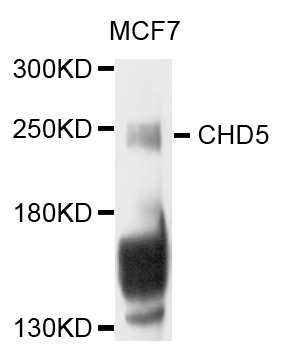-
Product Name
CHD5 Polyclonal Antibody
- Documents
-
Description
Polyclonal antibody to CHD5
-
Tested applications
WB
-
Species reactivity
Human
-
Alternative names
CHD5 antibody; CHD-5 antibody; chromodomain-helicase-DNA-binding protein 5 antibody
-
Isotype
Rabbit IgG
-
Preparation
Antigen: Recombinant fusion protein containing a sequence corresponding to amino acids 1530-1700 of human CHD5 (NP_056372.1).
-
Clonality
Polyclonal
-
Formulation
PBS with 0.02% sodium azide, 50% glycerol, pH7.3.
-
Storage instructions
Store at -20℃. Avoid freeze / thaw cycles.
-
Applications
WB 1:500 - 1:2000
-
Validations

Western blot - CHD5 Polyclonal Antibody
Western blot analysis of extracts of MCF-7 cells, using CHD5 antibody at 1:1000 dilution.Secondary antibody: HRP Goat Anti-Rabbit IgG (H+L) at 1:10000 dilution.Lysates/proteins: 25ug per lane.Blocking buffer: 3% nonfat dry milk in TBST.Detection: ECL Enhanced Kit .Exposure time: 10s.
-
Background
Chromatin-remodeling protein that binds DNA through histones and regulates gene transcription. May specifically recognize and bind trimethylated 'Lys-27' (H3K27me3) and non-methylated 'Lys-4' of histone H3. Plays a role in the development of the nervous system by activating the expression of genes promoting neuron terminal differentiation. In parallel, it may also positively regulate the trimethylation of histone H3 at 'Lys-27' thereby specifically repressing genes that promote the differentiation into non-neuronal cell lineages. Tumor suppressor, it regulates the expression of genes involved in cell proliferation and differentiation. Downstream activated genes may include CDKN2A that positively regulates the p53/TP53 pathway, which in turn, prevents cell proliferation. In spermatogenesis, it probably regulates histone hyperacetylation and the replacement of histones by transition proteins in chromatin, a crucial step in the condensation of spermatid chromatin and the production of functional spermatozoa.
Related Products / Services
Please note: All products are "FOR RESEARCH USE ONLY AND ARE NOT INTENDED FOR DIAGNOSTIC OR THERAPEUTIC USE"
